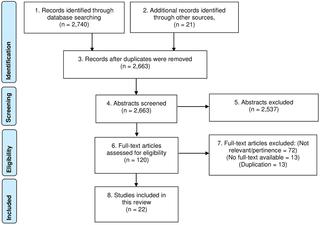Our official English website, www.x-mol.net, welcomes your
feedback! (Note: you will need to create a separate account there.)
Surveys of knowledge and awareness of antibiotic use and antimicrobial resistance in general population: A systematic review.
PLOS ONE ( IF 2.9 ) Pub Date : 2020-01-16 , DOI: 10.1371/journal.pone.0227973 Hathairat Kosiyaporn 1 , Sunicha Chanvatik 1 , Tibet Issaramalai 1 , Wanwisa Kaewkhankhaeng 1 , Anond Kulthanmanusorn 1 , Nithiwat Saengruang 1 , Woranan Witthayapipopsakul 1 , Shaheda Viriyathorn 1 , Supapat Kirivan 1 , Watinee Kunpeuk 1 , Rapeepong Suphanchaimat 1, 2 , Angkana Lekagul 1 , Viroj Tangcharoensathien 1
PLOS ONE ( IF 2.9 ) Pub Date : 2020-01-16 , DOI: 10.1371/journal.pone.0227973 Hathairat Kosiyaporn 1 , Sunicha Chanvatik 1 , Tibet Issaramalai 1 , Wanwisa Kaewkhankhaeng 1 , Anond Kulthanmanusorn 1 , Nithiwat Saengruang 1 , Woranan Witthayapipopsakul 1 , Shaheda Viriyathorn 1 , Supapat Kirivan 1 , Watinee Kunpeuk 1 , Rapeepong Suphanchaimat 1, 2 , Angkana Lekagul 1 , Viroj Tangcharoensathien 1
Affiliation

|
BACKGROUND
Currently, various tools exist to evaluate knowledge and awareness of antibiotic use and antimicrobial resistance (AMR) and are applied by various organizations. Previous systematic reviews have focused mainly on study findings such as levels of knowledge and AMR awareness. However, the survey procedures and data instruments used ought to be scrutinized as well, since they are important contributors to credible results. This review aims to assess the study methods and procedures of existing population-based surveys and explore key components which determine the general population's levels of knowledge and awareness of antibiotic use and AMR.
METHODS
We searched existing literature for population -based surveys which sought knowledge and awareness of antibiotic use or AMR in the general population. Databases searched included Ovid, MEDLINE and EMBASE, PsycINFO and Scopus, domestic journals and gray literature sources. Population-based cross-sectional studies published in English or Thai from January 2000 to December 2018 were included in the review. Quality assessment was conducted using the 'Appraisal Tool for Cross-Sectional Studies' (AXIS).
RESULTS
All 22 studies included in the analysis had clear objectives focusing on assessing people's levels of knowledge, awareness, attitudes and behavior relating to antibiotic use and awareness of AMR. These studies had employed appropriate methodologies for population-based cross-sectional surveys relative to research questions. More than half of studies (14 out of 22) had scientifically soundly designed methodologies which captured the representativeness of the population; whereas the remaining studies had unclear sample size estimations, inappropriate sample frames and selection biases. Half of the studies had tested the validity and reliability of the questionnaire. The common questions used by these surveys were categorized into four themes: behavior related to antibiotic use, knowledge and awareness of antibiotic use, knowledge and awareness of AMR and others such as receiving information about antibiotic use and AMR or cross-cutting issues like self-medication.
CONCLUSION
This review identified four key features of good practices in antibiotic use and awareness surveys: a) clear survey objective; b) scientifically sound sampling techniques ensuring representativeness; c) strategies for recruitment of samples and survey administration methods; and d) credible measurement to prevent non-sampling biases. During questionnaire design, the health systems context in terms of access to health services and antibiotics should be taken into account. In conclusion, to maximize the use of surveys, the application of findings in surveys and associated factors related to antibiotic use and AMR should primarily generate public health interventions and target specific groups to make progress in solving AMR problems.
中文翻译:

普通人群抗生素使用和抗菌素耐药性知识和意识调查:系统评价。
背景技术目前,存在各种工具来评估抗生素使用和抗菌素耐药性(AMR)的知识和意识,并被各个组织所应用。之前的系统评价主要集中在知识水平和抗菌素耐药性意识等研究结果上。然而,调查程序和使用的数据工具也应该受到审查,因为它们是可信结果的重要贡献者。本综述旨在评估现有基于人群的调查的研究方法和程序,并探讨决定一般人群对抗生素使用和抗菌素耐药性的知识和意识水平的关键组成部分。方法 我们检索了现有文献进行基于人群的调查,旨在了解普通人群对抗生素使用或 AMR 的知识和认识。检索的数据库包括Ovid、MEDLINE和EMBASE、PsycINFO和Scopus、国内期刊和灰色文献来源。 2000年1月至2018年12月以英语或泰语发表的基于人群的横断面研究纳入了该综述。使用“横断面研究评估工具”(AXIS)进行质量评估。结果 分析中包含的所有 22 项研究都有明确的目标,重点是评估人们对抗生素使用和 AMR 认识相关的知识、意识、态度和行为水平。这些研究采用了适当的方法进行与研究问题相关的基于人群的横断面调查。超过一半的研究(22 项中的 14 项)采用了科学合理的设计方法,捕捉了人群的代表性;而其余的研究则存在样本量估计不明确、样本框架不适当和选择偏差等问题。 一半的研究测试了问卷的有效性和可靠性。这些调查使用的常见问题分为四个主题:与抗生素使用相关的行为、抗生素使用的知识和意识、抗菌素耐药性的知识和认识以及其他问题,例如接收有关抗生素使用和抗菌素耐药性的信息或自我保护等交叉问题。药物。结论 本次审查确定了抗生素使用和认知调查良好做法的四个关键特征: a) 明确的调查目标; b) 科学合理的抽样技术确保代表性; c) 样本招募策略和调查管理方法; d) 可靠的测量以防止非抽样偏差。在问卷设计过程中,应考虑卫生系统在获得卫生服务和抗生素方面的背景。总之,为了最大限度地利用调查,调查结果的应用以及与抗生素使用和抗菌素耐药性相关的相关因素应主要产生公共卫生干预措施并针对特定群体,以在解决抗菌素耐药性问题方面取得进展。
更新日期:2020-01-17
中文翻译:

普通人群抗生素使用和抗菌素耐药性知识和意识调查:系统评价。
背景技术目前,存在各种工具来评估抗生素使用和抗菌素耐药性(AMR)的知识和意识,并被各个组织所应用。之前的系统评价主要集中在知识水平和抗菌素耐药性意识等研究结果上。然而,调查程序和使用的数据工具也应该受到审查,因为它们是可信结果的重要贡献者。本综述旨在评估现有基于人群的调查的研究方法和程序,并探讨决定一般人群对抗生素使用和抗菌素耐药性的知识和意识水平的关键组成部分。方法 我们检索了现有文献进行基于人群的调查,旨在了解普通人群对抗生素使用或 AMR 的知识和认识。检索的数据库包括Ovid、MEDLINE和EMBASE、PsycINFO和Scopus、国内期刊和灰色文献来源。 2000年1月至2018年12月以英语或泰语发表的基于人群的横断面研究纳入了该综述。使用“横断面研究评估工具”(AXIS)进行质量评估。结果 分析中包含的所有 22 项研究都有明确的目标,重点是评估人们对抗生素使用和 AMR 认识相关的知识、意识、态度和行为水平。这些研究采用了适当的方法进行与研究问题相关的基于人群的横断面调查。超过一半的研究(22 项中的 14 项)采用了科学合理的设计方法,捕捉了人群的代表性;而其余的研究则存在样本量估计不明确、样本框架不适当和选择偏差等问题。 一半的研究测试了问卷的有效性和可靠性。这些调查使用的常见问题分为四个主题:与抗生素使用相关的行为、抗生素使用的知识和意识、抗菌素耐药性的知识和认识以及其他问题,例如接收有关抗生素使用和抗菌素耐药性的信息或自我保护等交叉问题。药物。结论 本次审查确定了抗生素使用和认知调查良好做法的四个关键特征: a) 明确的调查目标; b) 科学合理的抽样技术确保代表性; c) 样本招募策略和调查管理方法; d) 可靠的测量以防止非抽样偏差。在问卷设计过程中,应考虑卫生系统在获得卫生服务和抗生素方面的背景。总之,为了最大限度地利用调查,调查结果的应用以及与抗生素使用和抗菌素耐药性相关的相关因素应主要产生公共卫生干预措施并针对特定群体,以在解决抗菌素耐药性问题方面取得进展。











































 京公网安备 11010802027423号
京公网安备 11010802027423号